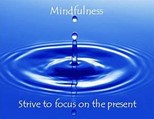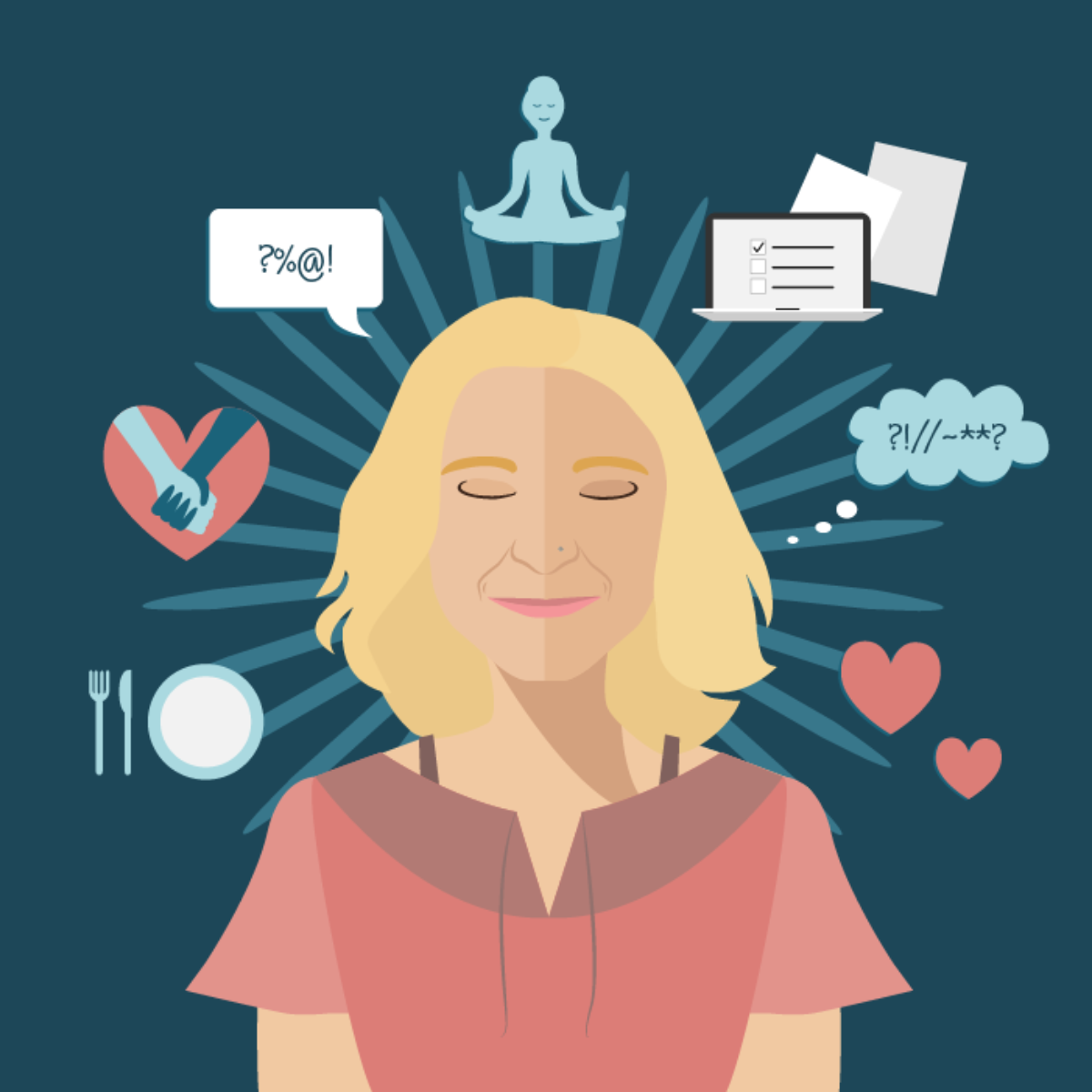By: Nicole Wozniak, Psy.D., LP.
What do you get when you add one part global pandemic, one part virtual schooling, and one part uncertainty about the future? The answer is the perfect recipe for anxiety. At some point this year, you have probably found yourself asking one of the following questions: What’s going to happen tomorrow? How will we get through the next semester? What if I lose my job tomorrow? How are the kids going to cope without seeing their friends at school this year? Do I have enough money saved? The current state of our world is causing many individuals to experience a strong fear about what the future will bring, along with concerns stemming from events that have already passed. Now, more than ever, is the time to begin learning and practicing mindfulness.
 Mindfulness is a therapeutic technique that was derived over time from old Buddhist practices. It has since become a powerful tool used by many practitioners to help individuals overcome serious emotional pain. Additionally, mindfulness was adapted to become one of the four modules practiced in Dialectical Behavior Therapy, a therapy modality developed for individuals who experience intense negative emotions. It can be used by itself, in conjunction with other therapies, or practiced as the full module from DBT. No, it is not just meditation, though meditation can have as much of a role in your mindfulness practice as you choose. The core principle of mindfulness stems from learning how to be present in the moment while building awareness about your emotions, thoughts, feelings, and behaviors. The goal is not necessarily to change or eliminate negative experiences, but simply to reduce the intensity with which we feel painful emotions.
Mindfulness is a therapeutic technique that was derived over time from old Buddhist practices. It has since become a powerful tool used by many practitioners to help individuals overcome serious emotional pain. Additionally, mindfulness was adapted to become one of the four modules practiced in Dialectical Behavior Therapy, a therapy modality developed for individuals who experience intense negative emotions. It can be used by itself, in conjunction with other therapies, or practiced as the full module from DBT. No, it is not just meditation, though meditation can have as much of a role in your mindfulness practice as you choose. The core principle of mindfulness stems from learning how to be present in the moment while building awareness about your emotions, thoughts, feelings, and behaviors. The goal is not necessarily to change or eliminate negative experiences, but simply to reduce the intensity with which we feel painful emotions.
Take this example:
I magine you are driving in your car on your way to somewhere important. Out of nowhere, a car swerves into your lane and cuts you off! How rude! That jerk should pay better attention! I should tailgate him so I can show him how angry he made me! You then begin driving somewhat erratically to catch up to him so you can give him an angry look or even an angry gesture. You arrive to your destination still fuming, angry about being cut off in traffic. You might even find yourself snapping at people at when you don’t even feel mad. Now ask yourself this question: Did my anger help me reach my goal of getting where I wanted to go safely? I might have arrived in one piece, but the likelihood of me getting hurt or in an accident (thus not reaching my goal) was much higher while feeling that intense anger. Acknowledging your anger, feeling it, and then allowing yourself to let it pass will allow you to act much more effectively in this situation. Staying in the past (but he cut me off!!!) keeps you from having positive experiences in the moment and can also cause you to act less effectively.
magine you are driving in your car on your way to somewhere important. Out of nowhere, a car swerves into your lane and cuts you off! How rude! That jerk should pay better attention! I should tailgate him so I can show him how angry he made me! You then begin driving somewhat erratically to catch up to him so you can give him an angry look or even an angry gesture. You arrive to your destination still fuming, angry about being cut off in traffic. You might even find yourself snapping at people at when you don’t even feel mad. Now ask yourself this question: Did my anger help me reach my goal of getting where I wanted to go safely? I might have arrived in one piece, but the likelihood of me getting hurt or in an accident (thus not reaching my goal) was much higher while feeling that intense anger. Acknowledging your anger, feeling it, and then allowing yourself to let it pass will allow you to act much more effectively in this situation. Staying in the past (but he cut me off!!!) keeps you from having positive experiences in the moment and can also cause you to act less effectively.
There are many ways to help bring yourself back into the present moment. Start by observing both internally (inside yourself) and externally (outside yourself). Many times, starting with external observations is easiest. For example, you might take a long walk and simply notice the world around you. Make non-judgmental observations about what you experience. Throw yourself into the activity completely, acknowledging off-topic thoughts when they intrude, but allowing them to slip quietly out of your brain, refocusing back on your walk. Now, the hardest part of all of that, is that pesky little word: non-judgmental. Mindfulness strives to take away the judgment from observations and descriptions.
Let’s use another example:
Imagine recently losing your job. You are sitting at your kitchen table with a stack of bills wondering how you will ever survive. Your thoughts are running wild. I am are a failure. How did I let this happen? If I was better at my job, they wouldn’t let me go. You can imagine all the emotional pain these thoughts might generate. But, what if we pulled out the judgment and just described the facts? I lost my job because there is a pandemic and they needed to make cuts. Money is going to be tight. I feel like a failure now because the wound is fresh. You will still feel sad about losing your job, but the emotional pain won’t be quite so intense. By internally observing your thoughts and feelings in this situation, it allows you a moment to reframe it in a less judgmental manner. Then you can begin going back to the present moment. Right now, I am financially okay. I will handle each day as it comes. What can I control or take care of today?
 A simple google search into Mindfulness will yield hundreds of results. There are many books, articles, and YouTube videos about different practices, techniques, body scans, meditations, etc. This blog barely even begins to scratch the surface. You can certainly learn mindfulness on your own, or with your individual therapist. However, one unique way of immersing yourself in the mindful experience is to join our 8-week Equine Therapy group at the Brighton Equestrian Club where we learn a new piece of mindfulness each week and have the opportunity to practice in the moment with our horses. See our website www.mccaskillfamilyservices.com or the BEC website www.clubbec.com for information about our upcoming groups.
A simple google search into Mindfulness will yield hundreds of results. There are many books, articles, and YouTube videos about different practices, techniques, body scans, meditations, etc. This blog barely even begins to scratch the surface. You can certainly learn mindfulness on your own, or with your individual therapist. However, one unique way of immersing yourself in the mindful experience is to join our 8-week Equine Therapy group at the Brighton Equestrian Club where we learn a new piece of mindfulness each week and have the opportunity to practice in the moment with our horses. See our website www.mccaskillfamilyservices.com or the BEC website www.clubbec.com for information about our upcoming groups.
Mindfulness practice ideas:
-Immerse yourself in the experience of taking a shower. Smell the shampoo, focus on the feeling of the water, examine the water droplets on your skin.
-Mindful eating. Spend a few extra minutes eating your meal. Chew each bite slowly. Enjoy the tastes and textures of each food.
-Take a mindful walk. Chant left foot, right foot or one two one two as you walk. Then take in the environment using all 5 senses.


